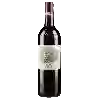
Château Cap de MagnetBordeaux Supérieur
In the mouth this red wine is a powerful with a nice balance between acidity and tannins.
This wine generally goes well with poultry, beef or veal.
Taste structure of the Bordeaux Supérieur from the Château Cap de Magnet
Light | Bold | |
Smooth | Tannic | |
Dry | Sweet | |
Soft | Acidic |
In the mouth the Bordeaux Supérieur of Château Cap de Magnet in the region of Bordeaux is a powerful with a nice balance between acidity and tannins.
Food and wine pairings with Bordeaux Supérieur
Pairings that work perfectly with Bordeaux Supérieur
Original food and wine pairings with Bordeaux Supérieur
The Bordeaux Supérieur of Château Cap de Magnet matches generally quite well with dishes of beef, veal or game (deer, venison) such as recipes of stuffed beef rolls, veal simmered with vegetables or wild boar stew (without marinade or wine).
Details and technical informations about Château Cap de Magnet's Bordeaux Supérieur.
Discover the grape variety: Raisaine
Most certainly Ardéchoise, formerly cultivated in the region of Privas, Aubenas, Joyeuse and Largentière. It is the result of a natural intra-specific crossing between the black ribier and the red grec. Today, Raisaine is totally absent from the vineyards and is therefore in danger of disappearing, although it is listed in the Official Catalogue of Wine Grapes, list A.
Informations about the Château Cap de Magnet
The Château Cap de Magnet is one of of the world's greatest estates. It offers 3 wines for sale in the of Bordeaux to come and discover on site or to buy online.
The wine region of Bordeaux
Bordeaux, in southwestern France, is one of the most famous, prestigious and prolific wine regions in the world. The majority of Bordeaux wines (nearly 90% of the production Volume) are the Dry, medium and Full-bodied red Bordeaux blends for which it is famous. The finest (and most expensive) are the wines of the great châteaux of Haut-Médoc and the right bank appellations of Saint-Émilion and Pomerol. The former focuses (at the highest level) on Cabernet Sauvignon, the latter on Merlot.
The word of the wine: Wine vinegar
Product of acetic fermentation of wine.











